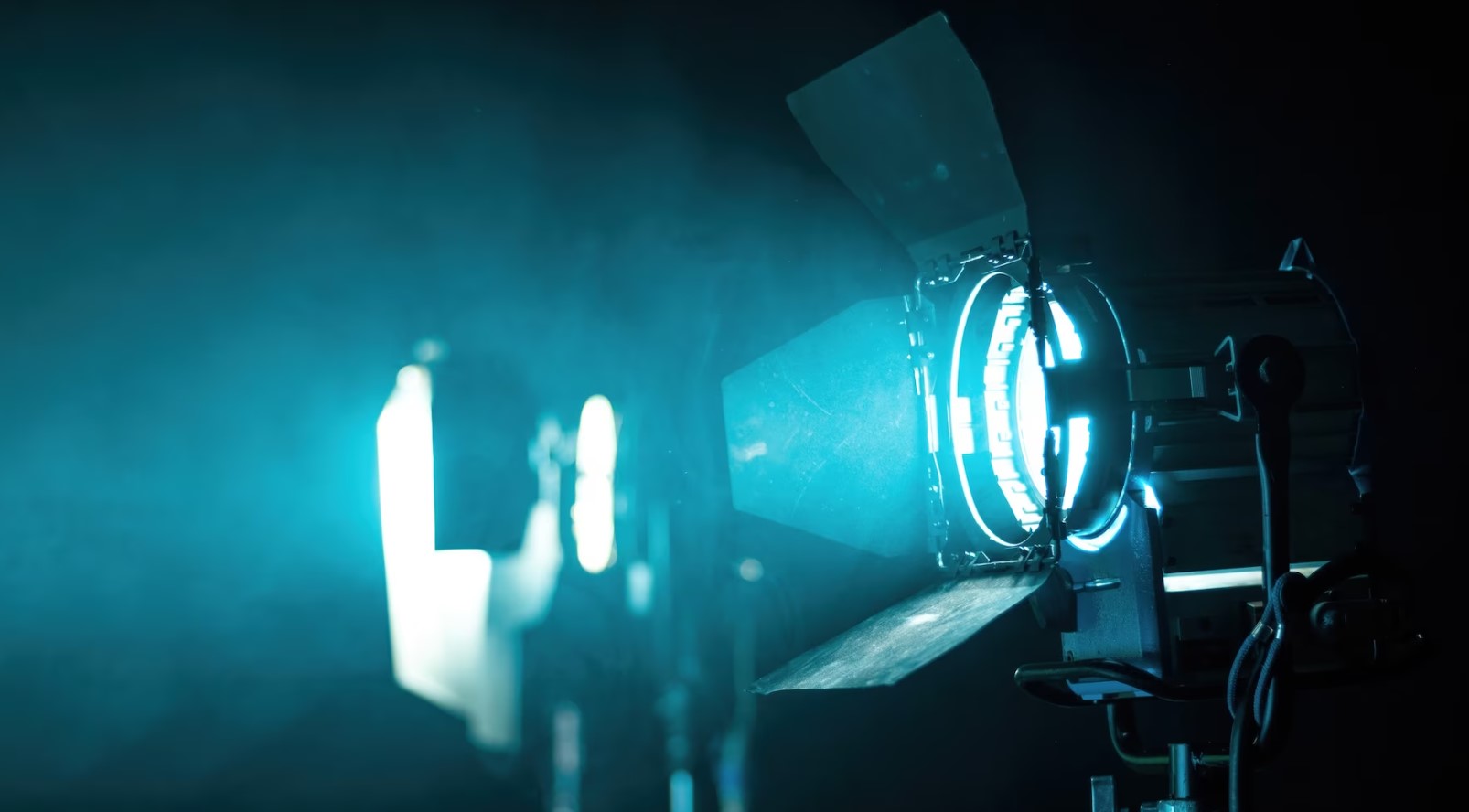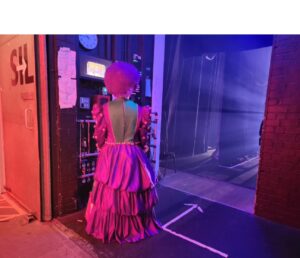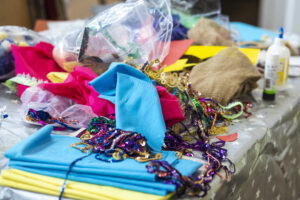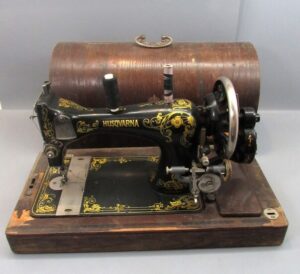12 Top Tips
After working in the theatre for a few years I started working on set by accident. I had been making on a film and they needed people to dress the actors so I volunteered assuming it would be similar to theatre and I could wing it. On my first day I didn’t know what to bring to set so I brought a bum bag (that everyone seemed to have) and put anything useful in I could think of before stuffing the rest with tissue to make it look fuller – as Costume professionals I am sure you know the importance of dressing the part! I did wing it and it was fine! But I wish I’d had more information about the etiquette because it is a very different environment than being in theatre. So, I thought I would write a helpful guide for all of you starting out on set. I am not going to tell you how to do the job. Plenty of people do it differently and you will pick it up as you go, but I can tell you how to behave on set as a newbie.
It’s not an exhaustive list and I recommend getting a trainee role on a short contract first to teach you the job, but if you are being thrown in at the deep end then maybe this will point you in the correct direction. Or if you are embarking on your first trainee role this might give you a hint for what you are getting yourself into. Sit down and make yourself a cup of tea because this is going to be a long article!
ONE – DON’T MOAN
My first piece of advice is: don’t slag off your department. This isn’t the most important thing to being a standby or daily but I am putting it at the top. It is easy when working long hours on set with people every day to be very open with your co-workers but there has to be a limit. You are a whole department and any legitimate grievances you have with your department should be taken up with them (any generic complaining and moaning should be done after your shift to non-work related friends). You as an individual benefit from a strong department and rumours travel fast. Everyone knows the departments that aren’t doing well and no one distinguishes if it’s a certain person or the whole group – so keep a good face on things; as far as the rest of the production knows you are in the best department there.
In the industry you will know that costume departments get a lot of shit and condescension from people who don’t know what we do or why and plenty of people will comment that we don’t really do anything, or at least nothing useful. DO NOT LET THEM EVER THINK THAT YOU SHARE THIS OPINON. You will never see a film crew look down on the camera crew that are ‘just swinging a lens’ or that lighting need an extra hour to set up. Part of this reason is that these departments are very serious about their jobs and never let anyone think that what they are doing is any less important than anyone else; audiences are WAY more likely to realise if someone’s jacket just changed colour than they are to notice that the lighting changed a bit. So don’t take it – you may feel like you are having a laugh with people but it demoralises the entire community and we all need to work together to improve people’s perceptions of us as a department.
TWO – SAY YES TO A RADIO
My second piece of advice is to ask for a radio wherever possible. Not all films will offer this, large scale films won’t but small-scale TV often has spare radios, so ask for one and get acquainted with it. They are invaluable and you will always know what is going on, plus when you get to larger scale productions and someone says ‘Who knows how to work a radio?’ you can look good telling them that you do. Get used to the way people speak on radio and listening to it in the background so you don’t embarrass yourself later. I have worked with several supervisors who refuse to use a radio so you may be expected to use yours for the entire department.
THREE – CONSTANT VIGILANCE
Don’t sit down for long periods of time. This is an obvious one but my god is it difficult to drum it into peoples’ brains. Costume and Hair and Makeup get so much shit for sitting around the monitors looking like they aren’t doing anything. Which is crap because look around, everyone else is perched as well, but not in one big group. If you do need to sit then sit up and look alert, people will instantly believe you are doing something and respect your opinion if you look like you are paying attention. On a similar note, stay awake. You may laugh, but this is serious. We often do night shoots without a turnaround day and when 3am rolls around it can be hard to keep your eyes open. It’s ok to go for a walk or get a cup of tea, but don’t think you can sneak off for a power nap… Someone will know and then everyone will know. Everyone on set is as tired as you and if they can stay awake so can you, rouse up and get on with it.
FOUR – STAY OFF YOUR PHONE
Whilst we are on the obvious points: stay off your phone. There is a lot of down time on set and it’s easy to look for distraction, but don’t. People scrolling through Facebook are visible a mile off, save your phone time for answering work texts and taking work calls. Don’t faff about on it, it looks bad and distracts you from your work.
FIVE – RESPECT THE CREATIVES
Remember that the director and designer should be treated with the utmost respect. This is of course true in theatre but it’s much more serious in film. If either of these two asks you to do ANYTHING then you do it, you don’t answer back or try to be funny. They can and will fire you, you will pick this up very quickly and the chances are that neither of them will speak to you on a large-scale production but that’s how it is.
SIX – KEEP CHECKS SNAPPY
Do checks and clearly say you are happy – I won’t explain how to do checks. ‘Costume happy thank you’ is the standard response, don’t leave room for ambiguity.
SEVEN – LEARN NAMES
Learn your actor’s names and know key people. Learning names is often difficult but it’s key to find a system that helps – you should be able to pick out every actor on set (particularly the ones you are responsible for) on command. It’s difficult when you have a large crowd or are jumping jobs every few days but make the effort, people appreciate this and it makes your job easier if you can say ‘Oh, Bill has his shirt untucked, can we sort that out?’ rather than ‘That SA over there with the blue jumper… Not that one, the tall one’. You should also know on set worker’s roles. This takes a bit of time to pick up but you should know the difference between a spark and a grip and be able to pick them out. It is useful when you need help with something but also if you are expecting people to know your role you should know theirs as well.
EIGHT – DON’T PUT YOURSELF DOWN
Don’t mention how new you are to the industry. So many newbies like to come on set and say ‘Oh I’ve only been doing this two months!’ and it’s sad but people instantly lose respect for them. If you don’t say this then they will assume you have been doing this for a while and know what you are doing, meaning they will forgive small slip ups thinking you are too busy, not that you don’t know what you are doing. The instant you admit how new you are you are inviting people to condescend to you and see any failure as proof you shouldn’t be here or be being paid what they are. People are of course often more generous than this, but you want to look as professional as you can.
NINE – ENTHUSIASM
It’s easy to get comfy sitting down waiting for your actors to get used but when the time comes look enthusiastic! The actors and your fellow crew feed off of your enthusiasm – If you look like you can’t be bothered then they won’t be either, or they will see you as lazy. Either way it is much better to look ready for the task at hand. You are going to have to do it anyways so do it with a smile on your face!
TEN – KEEP ON TOP OF PAPERWORK
Fill in continuity as you go. Again, I won’t tell you how to do this, but do it as you go. If you leave all the continuity sheets until the end of the day you end up being late and looking incompetent. You should come back to your supervisor on wrap with the sheets filled in and be ready to de-rig and go home.
ELEVEN – BUY SOME BOOTS
Possibly my best advice: Invest in a good pair of boots. Proper footwear is essential. Outside shoots are often cold, wet, muddy or slippery. There are heavy pieces of kit around that you don’t want to fall on your feet. It looks unprofessional not having proper footwear on, and it’s another small reason not to be taken seriously so next time you have some spare money buy a good pair of boots that will last.
TWELVE – BUILD YOUR KIT
Finally, add to your kit as you go. There is a lot you can put in your kit bag (I will publish a separate article with some ideas) but if you find yourself needing to borrow something then pick it up for the next time. People won’t mind lending you their kimble tag gun once but if you need it all week, they will get annoyed. You should be able to produce anything a designer asks of you at will within 6 months so start building up now to avoid future embarrassment.






